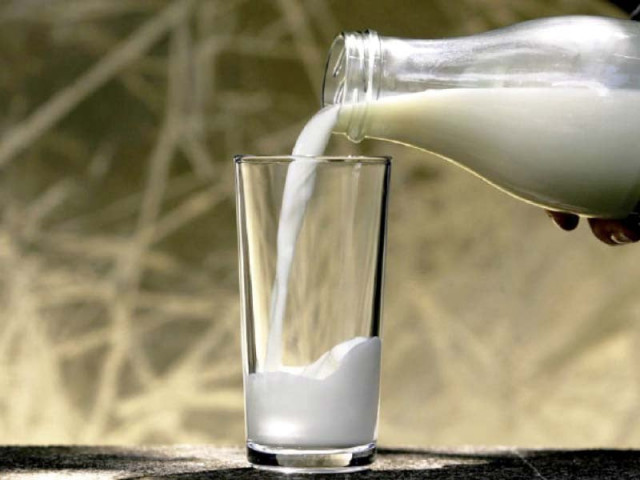Dairy items to see hike in GST
Industry had demanded exemption from 10% GST, sought zero rating

The government’s desire to put minimum possible tax burden on agriculture sector and political compulsions in the Khyber-Pakhtunkhwa (K-P) province has boiled down to its tax policy choices to tax the food items and opening avenues for possible tax evasion.
It has proposed in the Finance Bill to increase the General Sales Tax rate from 10% to 17% on yogurt, cheese, butter, milk cream, tea whitener, and flavoured milk.
This will push the cost of these dairy products in the range of 7% to 10%, resulting into additional payment of Rs5 billion by largely people living in cities that use these packaged food, said an official working in the dairy sector.
The government’s decision to change the tax regime was contrary to the understanding given to the Pakistan Dairy Association at a higher political level that also had the support of the economic ministers.
Read: Modernisation of dairy sector stressed
The assurance had been given on May 29th during a meeting chaired by the finance minister. The meeting had been attended by Hammad Azhar, Khusro Bakhtiar, Dr Ishrat Husain and Razak Dawood.
The dairy sector had demanded the government to exempt its products from 10% GST and declare it a zero rating sector for three years on trial basis.
The Pakistan Dairy Association representative has described the increase in tax rate as “fuelling to inflation and taxing health of nation”. According to the PDA’s calculations, the government will raise additional revenues of over Rs700 million from sale of cream, Rs700 million on dairy powders, Rs400 million each on yoghurt and flavoured milk and Rs1.5 billion on tea whitener cream.
The government has also increased the GST rate on raw cotton and ginned cotton to 17% in addition to charging standard 17% rate on plant and machinery not manufactured locally and having no compatible local substitutes, according to the Finance Bill.
Special Assistant to Prime Minister on Finance and Revenue Dr Waqar Masood Khan had assured the National Assembly Standing Committee on Finance that those tax exemptions that would stoke food inflation would not be withdrawn.
In order to meet some of the International Monetary Fund (IMF) demands, the government has been given options for Rs116 billion additional revenues. One of the options was to increase the sales tax on fertiliser rate from 2% to 17% for Rs80 billion and 17% on pesticides to generate Rs26 billion. The government did not pick this option to protect the farmers, said the official.
Despite taking difficult measures like taxing the daily use items, the government is still not able to bridge the gaps, said the officials. The possibility is that the IMF may monitor Pakistan’s revenue collection performance during the first couple of months before taking the case to its board for a decision
Similarly, the decision to withdraw 17% federal excise duty on steel and edible oil on the industries operating in erstwhile Federally Administered Tribal Areas has made those units setup in the settled areas uncompetitive.
The possibility of showing of production of steel and edible oil by some of the units that are operating in settled areas as production in erstwhile FATA will make the industry uncompetitive and open avenues for tax evasion.
Read more: Tax exemptions jump to record Rs1.31tr
At the time of merger of FATA and PATA in the K-P certain constitutional guarantees had been given, which we have to respect, said Finance Minister Shaukat Tarin while responding to a question by The Express Tribune. The minister said that the tax-free status of the erstwhile FATA would end in June 2023.
But the edible oil industry claims that the move has opened avenue for roughly Rs15 billion worth tax evasion annually. These figures could not be independently verified.
In order to exempt erstwhile FATA, the government withdrew federal excise duty (FED) applicable on import of edible oil but imposed 17% GST at the import stage. The industry players suspect that the units working in the FATA and PATA will now increase their imports and sale in the local market without taking palm oil and olein as raw material to FATA and PATA industries as there no industries and no consumption of that level.
The Finance Bill also proposes to extend the scope of collection of 0.5% advance tax from distributors, of pharmaceuticals, poultry and animal feed, edible oil and ghee; battery; tyres; varnishes; chemicals; cosmetics; and IT equipment.
Published in The Express Tribune, June 13h, 2021.
Like Business on Facebook, follow @TribuneBiz on Twitter to stay informed and join in the conversation.


1733130350-0/Untitled-design-(76)1733130350-0-208x130.webp)
















COMMENTS
Comments are moderated and generally will be posted if they are on-topic and not abusive.
For more information, please see our Comments FAQ